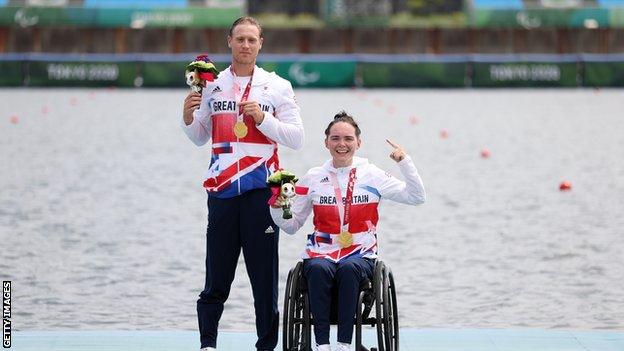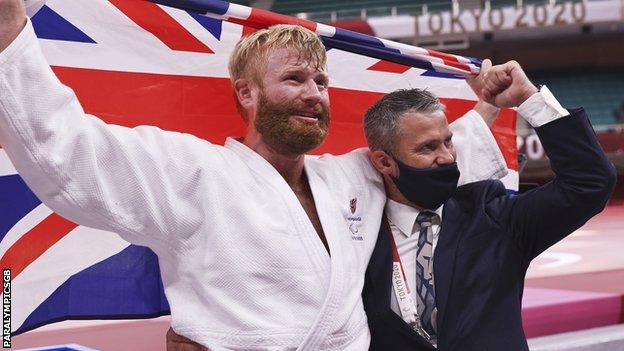Tokyo Paralympics: Great Britain's Hannah Cockroft wins third successive 100m gold
- Published
Tokyo Paralympics: Hannah Cockroft sets new world record as she claims third consecutive T34 100m gold
Paralympic Games on the BBC |
|---|
Venue: Tokyo, Japan Dates: 24 August-5 September Time in Tokyo: BST +8 |
Coverage: Follow on Radio 5 Live and on the BBC Sport website |
Hannah Cockroft set a new world record to win her third consecutive T34 100m crown and claim a stunning sixth Paralympic title, as Great Britain won seven golds on day five in Tokyo.
Cockroft, 29, bettered her own record with a time of 16.39 seconds to overhaul team-mate Kare Adenegan, who took silver ahead of Australia's Robyn Lambird.
The wheelchair rugby team claimed a historic victory in their final, beating the United States 54-49 for GB's first Paralympic medal of any colour in the sport.
Lee Pearson increased his personal haul to 13 Paralympic golds as he combined with Natasha Baker and Sophie Wells to retain the Para-equestrian team title for Great Britain, which they have won at every Games since the sport made its debut in 1996.
There were two rowing golds as GB's PR2 mixed double sculls pair Lauren Rowles and Laurence Whiteley, and the PR3 mixed coxed four team, successfully defended their respective Paralympic titles.
Rowles and Whiteley, who are also the reigning world and European champions, won by 4.86 seconds from the Netherlands, while China took bronze.
The mixed four of 2016 gold medallist James Fox, plus Ellen Buttrick, Ollie Stanhope, Giedre Rakauskaite and cox Erin Kennedy, finished 11.05 seconds clear of closest challengers the USA.
In the triathlon, GB's Lauren Steadman was victorious in a women's PTS5 event that also saw Claire Cashmore win bronze, while George Peasgood earned silver behind Rio champion Martin Schulz in the men's race.
Judoka Chris Skelley triumphed in the -100kg final with Elliot Stewart taking silver in the -90kg category.
Defending champion Will Bayley, who, like Steadman, is a former Strictly Come Dancing contestant, had to settle for silver as he was beaten by China's Yan Shuo in the table tennis men's singles class seven - losing 3-1 in the final after taking the first game.
The swimmers added more medals to the team tally with silver for Ellie Challis, the youngest member of the ParalympicsGB team, in the S3 50m backstroke and also for Louise Fiddes in the SB14 100m breaststroke, with a bronze for Scott Quin in the men's race.
In wheelchair fencing, the men's foil team of Piers Gilliver, Dimitri Coutya and Oliver Lam-Watson took silver after losing 45-38 to China in the final. It means Gilliver finishes the Games with a gold, silver and bronze, Coutya has a silver and three bronzes and Lam-Watson a silver and bronze.
In athletics, Maria Lyle won her second bronze when she finished third in the T35 200m.
Tokyo Paralympics: Watch full-time scenes at GB claim historic wheelchair rugby gold
Cockroft's latest gold 'so special'; Peacock into final
Wheelchair racer Cockroft, a 12-time world champion, increased her impressive collection of Paralympic titles in style, following her treble in the 100m, 400m and 800m events at Rio 2016.
The ParalympicsGB co-captain, who will also contest the 800m in Tokyo, had improved her world records in the 100m, 200m, 400m and 800m earlier this year.
And though Adenegan, who clocked 17.03, made the faster start, Cockroft overhauled her fellow Briton.
"This last 18 months has been so weird and so, so hard. I just wish the stadium had been full to witness that," Cockroft told Channel 4.
"It's so special. It just feels like a massive, massive relief. We didn't know if we'd be here in Tokyo. I was so nervous. I did everything I could and thankfully it was enough.
"I know Kare is a strong starter. She's always good off the gun so I knew I had to let her go and take my time."
On aiming for the 800m title on Saturday, she added: "The 800m is my comfortable event now. I am confident but it's all to play for."
Jonnie Peacock, who like Cockroft is bidding for a third Paralympic title in a row, qualified safely for Monday's T64 100m final (12:43 BST) with second place in his heat.
"It went as I thought it would - I switched off for the last 20 metres," he told Channel 4. "Tomorrow is what it is all about - one more race."
GB rowers rule again
Tokyo Paralympics: GB win PR3 mixed coxed four rowing gold
At the Sea Forest Waterway, Whiteley marked his 30th birthday with a second Paralympic title alongside Rowles as the pair built steadily through the race.
"As 30ths go, spending it in Japan in a Paralympic final, and spending it with Lauren with a gold medal around our necks, yes, I can think of worse," he told BBC Radio 5 Live.
"We did what we set out to do. We knew they'd go out quick, but we knew we'd come back at them six minutes later. We have absolute confidence and a lot of trust."
Rowles, 23, said that she had faced huge challenges since winning gold five years ago.
"After 2017 and after we won gold in Rio, I wasn't in a good place in my life. I really didn't want to be on this planet," she said.
"The pressure of performance sport just took me away from what's important in life, and that's being happy.
"To be the happiest person I've ever been crossing that line, I don't think this performance would ever have happened if I'd just kept pushing through and just kept battering myself and not overcome the anxiety.
"We've stuck by each other throughout and backed each other and I'm grateful to Laurence for letting me do that."

Whiteley and Rowles are the world, European and Paralympic champions in their event
The four continued GB's dominance in the event with the last loss coming at the 2010 Worlds.
"We are incredibly tough on ourselves; we are always pushing the standards. Complacency is not an option for us," said Fox.
"There's been a lot of hard graft. I've had hip operations and several injections to get myself here but I'm so happy to be a part of the GB success."
Sweet success for Skelley and Stewart
Skelley, 28, had to end his career as a mechanic after his eyesight deteriorated as a teenager while Stewart, 33, went one better than his father Dennis, who won judo bronze at the 1988 Olympics in Seoul.
"It's been a long road. Eleven years ago, I was in the darkest part of my life because everything left me, and the only thing left was my judo," said Skelley, who finished fifth in Rio but came to Tokyo as world number one.
"I never expected to do this as a job. I love judo and to stand here as a Paralympic champion, I'm lost for words. I can't believe it."

Skelley celebrated with head coach Ian Johns
Judo has always been part of Stewart's life. He was just seven months old when his father won his medal in Seoul, and joined the Paralympic programme after a sudden deterioration in his eyesight when he was 28.
"It's a dream come true for me and for my dad," he said. "He's always wanted me to do just as well as he has, even better, so I'm sure he will be super happy."
Gold, silver and bronze for GB triathletes
Tokyo Paralympics: Lauren Steadman wins PTS5 triathlon gold
Victory in the women's triathlon was redemption for Steadman, who had to settle for silver in the PT4 triathlon at Rio 2016 after a costly mistake during the swim when she missed a crucial buoy.
She made no such error in Tokyo, however, finishing in one hour four minutes 46 seconds - 41 seconds ahead of the USA's defending champion Grace Norman - with Cashmore two minutes and 50 seconds behind her compatriot.
American Norman led after the 750-metre swim but Steadman swept past her rival on the 20km bike ride and established an 18-second advantage, which she extended in the final 5km run. Cashmore was able to claim bronze despite receiving a one-minute penalty for a drafting violation.
In the men's PTS5, Peasgood took the lead in the swim but was caught by Germany's Schulz midway through the run section and eventually finished 45 seconds behind.
What about the other Britons on day five?
The GB men confirmed their place in the wheelchair basketball quarter-finals with a comfortable 69-57 victory over Iran.
They will finish their pool games against Australia on Monday (09:00 BST).
In the wheelchair tennis, quad doubles pair Andy Lapthorne and Antony Cotterill were beaten 6-2 6-0 in the semi-finals by Dutch duo Niels Vink and Sam Schroder and will play Japan's Mitsuteru Moroishi and Koji Sugeno for bronze.
Jordanne Whiley and Lucy Shuker won their women's doubles quarter-final for the loss of just two games, while Alfie Hewitt and Gordon Reid did not lose a game against Austrian pair Thomas Flax and Nico Langmann in the second round.
World watch
Tokyo Paralympics: Jason Smyth wins sixth gold medal by one-hundredth of a second in T13 100m final
Irish sprinter Jason Smyth beat Algeria's Skander Djamil Athmani by one-hundredth of a second to win the T13 100m final.
The 34-year-old dipped just ahead of Athmani to earn a sixth Paralympics gold medal in a time of 10.53 seconds.
There was a dramatic conclusion in the women's PTWC triathlon, as the USA's Kendall Gretsch, 29, narrowly edged out Australia's Lauren Parker in a sprint finish.
Gretsch, who won two Winter Paralympic golds in skiing at Pyeongchang in 2018, officially won by 0.01 seconds as she overtook Parker on the final straight.
In the men's PTWC event, the Netherlands' Jetze Plat secured consecutive Paralympic golds after his success when the sport made its debut in Rio.
Belarus swimmer Ihar Boki won his fourth gold in Tokyo with victory in the S13 50m freestyle while American wheelchair racer Daniel Romanchuk won his first Paralympic title in the T54 400m.
There was double gold for Norway with rower Birgit Skarstein, who competed in her country's version of Strictly Come Dancing, triumphing in the PR1 women's single sculls, while visually impaired sprinter Salum Ageze Kashafali set a new world record of 10.43 seconds to take the T12 100m crown.

Was Ivan that Terrible? You're Dead to Me looks at Russia's cruel ruler
Transfer Gossip Daily: Get up to speed with the latest tantalising rumours
